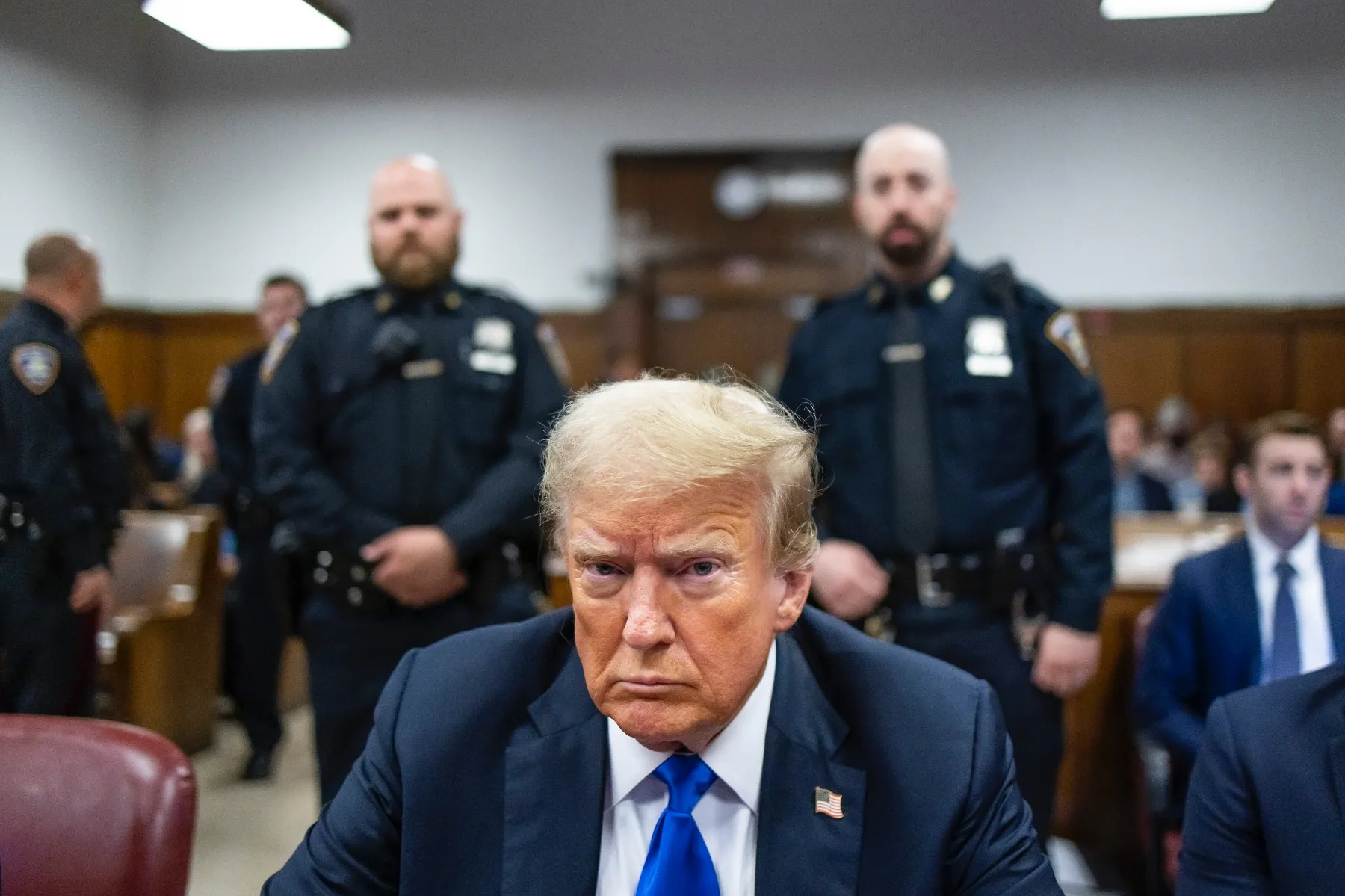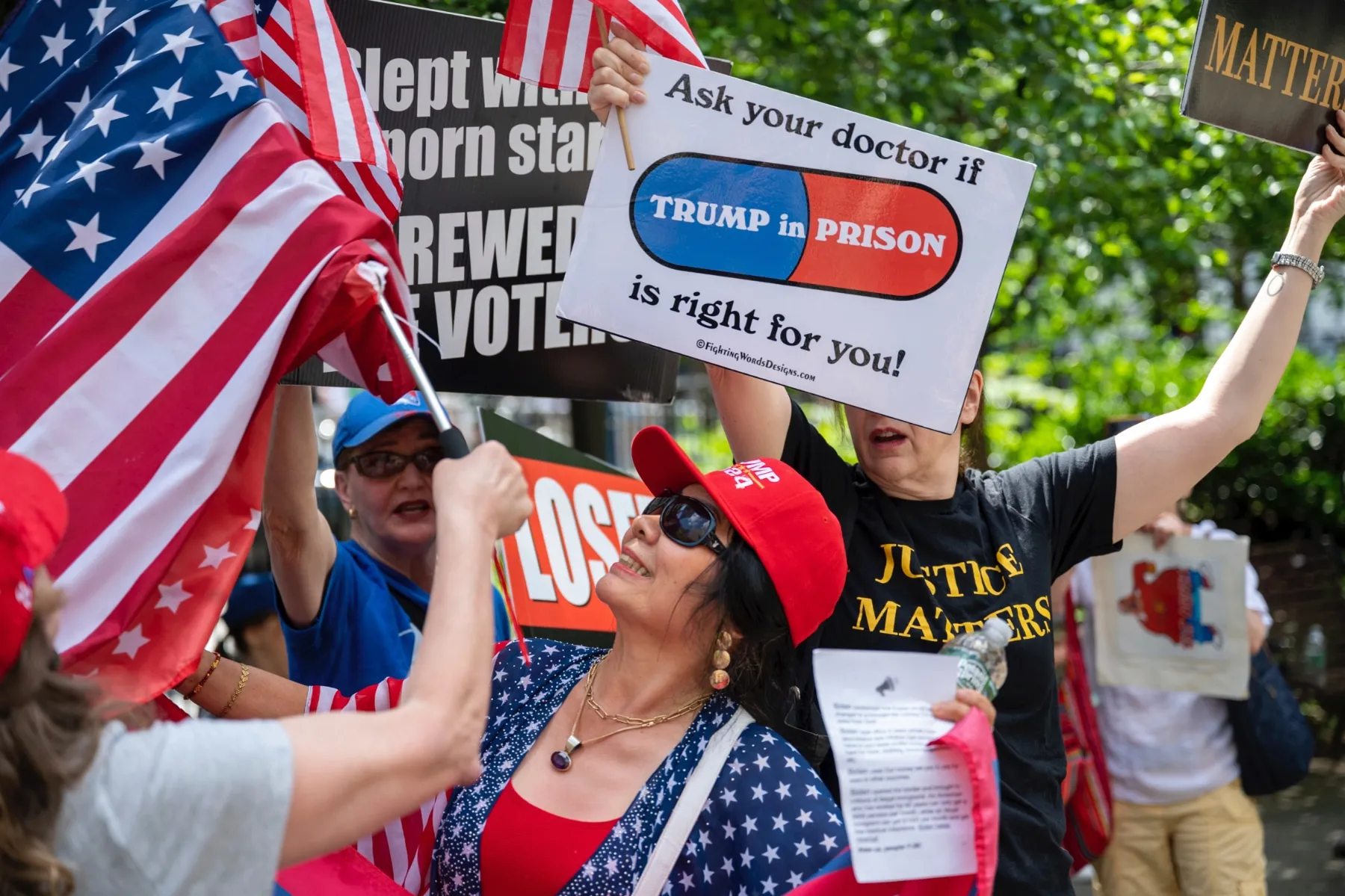The 19th is committed to covering the unfinished business of voting rights. Read more about how we’re approaching that in this pivotal election.
Donald Trump on Thursday was found guilty in a first-of-its-kind criminal trial of a former U.S. president that put a spotlight on an attempt to falsify business records, keep secret an adult film actor’s story of an affair and change the outcome of an election. Now the question becomes one that some witnesses in the trial said was asked in 2016: Will women voters care?
During the roughly six-week trial, witnesses testified on the Trump campaign’s heightened concern in the lead-up to the 2016 election about his standing with women voters. Reporting at the time spotlighted several women claiming sexual misconduct by Trump. Then an “Access Hollywood” recording was made public that captured Trump talking about grabbing women’s genitals.
According to testimony by Michael Cohen, Trump’s former attorney and fixer, when Trump’s team learned just weeks before the election that the adult film actor, Stormy Daniels, may share her story publicly, Trump responded: “Guys may think it’s cool — but this is going to be a disaster for the campaign.” Cohen faced hours of questioning during the trial. On the stand, Cohen also recalled Trump saying, “Women will hate me.”
Trump would go on to win the presidency, in part because of support from White women voters.
These voters could make the difference in the 2024 election as they weigh the significance of the trial and testimony, said Debbie Walsh, the director of the Center for American Women and Politics at Rutgers University.
-
The Verdict Is In:
“Where I think the trial harms Trump is with suburban women, White college-educated women, who have been Republicans in the past but have been drifting away from the party the more Donald Trump is the face of the party,” Walsh said. “It reminds them, if they have forgotten, of the chaos of Trump and makes them ask if they can handle four more years.”
Sarah Longwell, a longtime Republican strategist who is also a member of The 19th’s board of directors, has been talking to groups of voters, particularly those who voted for Trump in the past and are hesitant to do so again. Not a lot of the people she has talked to are following Trump’s criminal trial very closely, Longwell said.
“I think the details of the Stormy Daniels interaction would have mattered a great deal in 2016, but they matter much less now,” said Longwell, the co-founder of Defending Democracy Together and president of Republican Accountability PAC, both of which have opposed Trump. “We’re so numb. I think we were less numb back then. We were a different country. We hadn’t accepted all of these things that we’ve now accepted.”

To many voters she’s spoken with, the details of the case seem like old news, hearkening back to 2016 and not revealing any new information on Trump’s character. Still, Longwell argued, the verdict might play a major role in the results of the election if it pushes swing voters and reluctant Republicans to not vote for Trump or sit out the election altogether.
“Everybody knows that Donald Trump is a dirtbag when it comes to women: that he doesn’t respect women, that he has cheated on his wives and has all these allegations of sexual assault,” said Longwell, who is public about her rejection of Trump as a candidate.
Despite this, Longwell said Trump has maintained a loyal base of women voters. What feels different this election, however, is that abortion access is now top of mind for many voters.
“It now matters in a much more policy-focused way how Donald Trump thinks about women — that he doesn’t respect them, would sell them out, wouldn’t do anything to defend their rights — sort of matters in a different way now, because abortion is such an important issue going into this election. They’re talking in focus groups, and I do think it has sort of raised the salience for women that Trump is a misogynist.”
The 2022 Supreme Court ruling in Dobbs v. Jackson Women’s Health Organization that overturned federal abortion protections means the landscape of abortion policy in the United States varies widely. Trump has taken credit for Dobbs, pointing to the justices he appointed who overturned Roe v. Wade. For many women voters, the decision placed issues of bodily autonomy and how politicians view them front and center.
-
Read Next:
“There are, I think, a reasonable number of women voters who might put those two things together in ways that would deter them from voting for Donald Trump,” said Nichole Bauer, a political science professor at Louisiana State University who studies gender and is the author of “The Qualifications Gap: Why Women Must Be Better than Men to Win Political Office.”
“Had Dobbs never happened, and had abortion not become this major galvanizing and very motivating issue for women, then the extent to which this trial might deter people who might vote for Trump, from voting for Trump, might not matter as much,” Bauer added. “But combining it with that very big issue, I think could lead some women who might have voted for Trump to rethink that choice.”
Bauer said while some voters were tuned out of the trial, others might remember it by how Trump’s defense team questioned Daniels during her testimony, which included salacious details of an alleged affair.
During that cross-examination, Trump’s attorney Susan Necheles tried to discredit Daniels by highlighting her negative feelings toward the former president: “Am I correct that you hate President Trump?”
“Yes,” Daniels responded.
“And you want him to go to jail?” Necheles followed up.
“I want him to be held accountable,” Daniels said.
When Necheles later tried to find discrepancies in Daniels’ account, Daniels responded: “You’re trying to make me say it changed, but it hasn’t changed.”
That back-and-forth might offer a glimpse to voters about how Trump feels about women, Bauer said.
“He thinks about them as a group that he holds power over,” she argued. “And the extent to which, that I can tell, that he cares about issues that affect women, or experiences that women have that are harmful in American politics, in social and economic ways — it’s really just like to what extent will this help him get more power?”
-
Previous Coverage:
-
Previous Coverage: Will the jury believe Stormy Daniels?
Trump did not testify during the trial, which kicked off with jury selection on April 15 and ended with closing arguments this week. He faced 34 counts of falsifying business records related to a $130,000 payment that Cohen says he made on behalf of Trump to Daniels before the 2016 election to keep Daniels quiet about what she has described as a brief one-night sexual encounter between her and Trump in 2006. The prosecution also highlighted a similar $150,000 payment, made months earlier, to Karen McDougal, a model and actress who says she had an affair with Trump in 2006.
This is the first of four criminal trials Trump is expected to face, and likely the only one to happen before the November election. Earlier this year, a judge ruled in a civil case brought by New York Attorney General Letitia James that Trump had lied about his net worth. He has appealed and had to put up a bond of $175 million; he owes more than $450 million.
Trump has also had rulings against him in civil cases related to accusations brought by former Elle advice columnist E. Jean Carroll, who says Trump assaulted her in a dressing room in the 1990s. In May 2023, Trump was found liable of sexual abuse and defamation; he was found liable again in January for defaming Carroll and ordered to pay $83.3 million. He is appealing.
But even with the focus on this trial over business records, some variables could lessen its potential political blow for Trump. The trial concluded several months before the general election, so it might not be top of mind for those swing voters as they head to the polls.
How the public processed the trickling of news from the trial could also matter, said Mary-Kate Lizotte, a political science professor at Augusta University. No cameras or audio recordings were allowed in the courtroom, a decision that restricted the potency of the most damning testimony from Daniels and Cohen. She compared that to the virality of imagery that emerged from the televised defamation trial of actor Johnny Depp that focused on abuse claims made by his ex-wife, Amber Heard.
“Seeing them actually give their testimony rather than having someone who was in the courtroom describe how believable they seem to be — people like to make up their own minds,” Lizotte said of the Daniels and Cohen testimony. “I think a lot of that stuff probably would have gone viral if there was video of it. And right now, the average American isn’t really paying attention to the trial because it’s not making good TikTok content. It’s not making good social media content because there aren’t those clips.”
Lizotte also cautioned against putting too much weight on polling that indicates some people may reconsider their support of Trump if he’s convicted of a felony. While some respondents may have been considering their general views on law and order, they’re often not good at predicting their future behavior when it comes to a hypothetical situation.
“You have to take those polling findings with a grain of salt,” she concluded.
But in presidential elections where battleground states can be decided by a few thousand votes, Walsh said the outcome of the election could come down to these undecided women voters on the margins.
“We know that these elections now are razor thin,” Walsh said. “It doesn’t take a big group in a particular state to make a big difference.”








